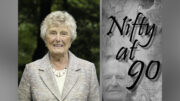The Associated Press
Forty years after military service academies opened their doors to women, the U.S. Coast Guard Academy marked the milestone at a ceremony Monday as it welcomes a class with a record 38 percent of female cadets.
The enrollment rate for women has not been matched at the Naval Academy, the Military Academy at West Point or the Air Force Academy, though each has seen an increase in female enrollment at a time when gender barriers have been falling across the armed services.
One graduate who was among the first women to enroll at the Coast Guard Academy in 1976 said her cadet years were the start of a career in which she regularly was the first or among the first women every step of the way.
“It was hard, but it’s supposed to be hard,” Michele Fitzpatrick said. “We all just had to do the best we could and help each other get through the process.”
The academies, which were required to admit women under a law signed by President Gerald Ford, provide a cost-free education, and students upon graduation are commissioned as junior officers with requirements to serve a minimum number of years. Most academies say jumps in female enrollment reflect growing demand and not any special recruiting efforts.
But at West Point, where women account for 22 percent of the incoming class of 2020, marketing initiatives have helped boost female enrollment that remained around 15 to 17 percent until two years ago. With women accounting for 17 or 18 percent of the Army officer corps, the academy wants to graduate women at or above that level, according to Col. Deborah McDonald, the academy’s director of admissions.
The pool of applicants has been expanded, McDonald said, through efforts including a new brochure addressing admission of women and the addition of lacrosse and women’s rugby programs.
“The women’s lacrosse program really opened up an aperture for many young ladies in high school that play lacrosse and wanted to play lacrosse at the NCAA level,” McDonald said.
Female enrollment at the Naval Academy in Annapolis, Maryland, has risen steadily from 24 percent for the Class of 2016 to an anticipated 28 percent for the Class of 2020. At the Air Force Academy in Colorado Springs, Colorado, a slow and steady increase has brought female enrollment to around 22 percent.
West Point, the Naval Academy and the Air Force Academy, which are overseen by the Defense Department, have faced criticism from some who say female enrollment remains too low. The Service Women’s Action Network and the American Civil Liberties Union filed a lawsuit last year seeking information on gender targets, arguing women were underrepresented considering opportunities in military leadership and the repeal of rules excluding women from combat and other duties.
A SWAN spokesman said Monday that it is reviewing documents obtained in a settlement with the federal government.
At the Coast Guard Academy, which is overseen by the Department of Homeland Security, Fitzpatrick and other alumnae from that first class of women were being acknowledged at a reporting-in ceremony that marks the start of an introductory training period for new cadets. Fitzpatrick, who has taught at the academy and works as a contractor for the Coast Guard, said she does not believe there should be targets for gender enrollment.
“You want the best person for the job, regardless of gender,” she said.







































